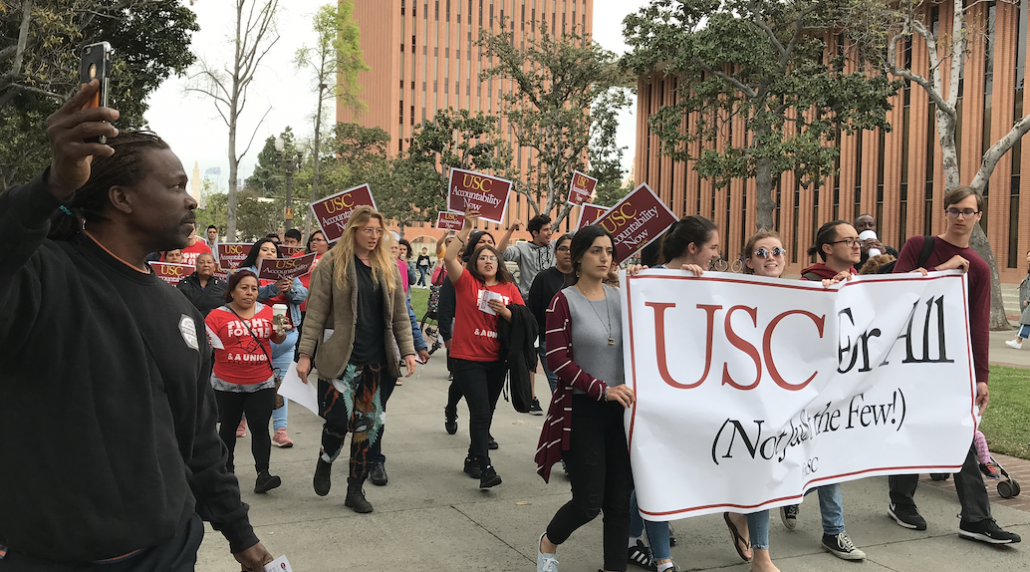USC community marches for University accountability

Nearly 50 students, alumni, community leaders and local residents marched from Jefferson Boulevard to Bovard Auditorium Tuesday to present a list of demands to University administrators. USC Forward — a coalition of unions, organizations and individuals calling for from USC accountability and transparency — organized the march, which marked the fourth day of the demonstration that started Saturday.
Stephe “Cue” Jn-Marie, a pastor from The Row Church at Skid Row, helped present the list of demands to University Chief of Staff Dennis Cornell along with several students and USC Forward leaders.
“As you’re well aware, the University of Southern California has lost its way,” the letter read. “The thousands of brilliant, hardworking and dedicated students, staff and faculty of this University have seen their work and reputations tarnished by the despicable actions of an elite few and the utter failure of leadership to address it.”
The letter called for admission accessibility, housing affordability, community benefits, campus safety and labor rights. While the organizers hoped to give their demands directly to President-elect Carol Folt and Interim President Wanda Austin, both were unavailable.
The protesters demanded a response from the University within 48 hours of Tuesday’s march. Jn-Marie said the organizers previously sent their demands to the University administration, but wanted to deliver them in person Tuesday to emphasize the need for change.
“We want to make sure that they understand that we’re not going away and this is not a flyby night thing,” he said. “We want to talk to the president. We want to address some of these issues that we’re having in our communities because these issues have a reverberating effect on communities outside of USC’s jurisdiction.”
Shany Ebadi, a junior majoring in political science, said she wants the University to outline specific steps it plans to take in working toward solutions for students, faculty, staff and local residents. She said these steps should suggest ways to have more affordable housing options and the ability to form unions among other demands rather than creating task forces and committees.
“They’ve definitely been having talks of where they want the University to go, that is evident,” Ebadi said. “The next step is to see exactly where our communities are going to fit into those plans and making sure that we are partners in those decisions.”
Kameron Hurt, a senior majoring in international relations, said USC has been slow to make changes that could help students and surrounding community members because these demographics do not make profits for the University. Hurt said it is important for Folt to address the group’s demands as soon as she is appointed in July.
“If by day one she is not addressing these issues the pressure needs to be there because she knew what she was stepping into in this role,” Hurt said. “She knew the history of scandals and the corrupt institution that she was placing herself in, so there’s no excuses.”
Hurt said he also wants to see changes in the Board of Trustees, so that the Board comprises USC faculty, staff and students rather than businesspeople who are outsiders to campus issues.
Jn-Marie said USC Forward will continue to push the University to make change. While he found the turnout at the march encouraging, he said the group and its partner organizations will reach out to more community members and rally a larger group of supporters if demands are not heard.
“We haven’t really reached out to the community to really draw the crowds, so this is just a small turnout,” he said. “We wanted to give them an opportunity before we really [went] full scale and bring a large number of individuals here.”
Ebadi said she encourages students who are angered by discrimination and other campus-wide issues to take action by participating in demonstrations like the march to have their demands heard by University officials.
“There needs to be a systemic change,” she said. “It’s all about showing up for those who need it, showing up for those who need it because there’s power in numbers.”
Isa Uggetti contributed to this report.

